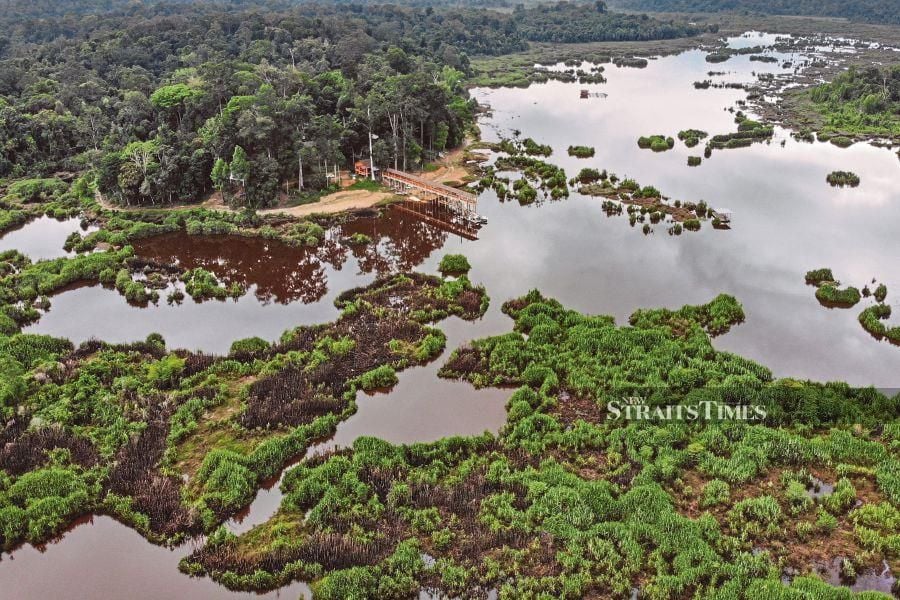Articles / Newsletter

2021 marks the 50th anniversary of the signing of the Convention on Wetlands of International Importance in Ramsar, Iran, on Feb 2, 1971.
Annually, the date is celebrated as World Wetlands Day. The theme for this year's celebration is Wetlands and Water.
Better known as the Ramsar Convention to commemorate its birthplace, there are 170 contracting parties with more than 2,400 wetlands listed as Ramsar sites the world over.
It recognises a wide variety of natural and man-made wetland habitats, ranging from rivers to reefs, and dams to padi fields, swamps, marshes, billabongs, lakes, salt marshes, mudflats, mangroves, coral reefs, lagoons, peatlands, fens, bogs, or bodies of water, whether natural or artificial, permanent or temporary.
Underground wetlands are also recognised. The convention encourages the designation of sites containing representative, rare or unique wetlands, or wetlands that are important for conserving biological diversity.
Once designated, these sites are added to the convention's List of Wetlands of International Importance and become known as Ramsar sites.
In designating a wetland as a Ramsar site, contracting parties agree to establish and oversee a management framework aimed at conserving the site and ensuring its wise and sustainable use.
This is broadly defined as maintaining the ecological, botanical, zoological, limnological or hydrological character and importance of the wetlands.
Wetlands are extremely important for the range of ecosystem services and for the multitude of benefits they provide to humans and nature.
One of the key provisioning and regulating services that wetlands provide is the supply of fresh water, as well as the maintenance of healthy hydrological cycle, ecosystems and climate.
Clean water is extremely critical for human survival, and 2.2 billion people around the globe still do not have access to safe drinking water.
Despite this, the use and demand for fresh water has increased six-fold in the last 100 years, with an increment of one per cent each year.
Only 2.5 per cent of water on earth is actually fresh water. Out of this, less than one per cent is usable for direct human consumption. Constituted in rivers, lakes, swamps and underground reservoirs, these wetlands are the essential sources of fresh water.
It is therefore pertinent to ensure the protection and proper management of these wetlands as a supplier of fresh water. Respecting the national sovereign rights, Ramsar Convention allows contracting parties to manage, protect and conserve wetlands, particularly Ramsar sites, according to the nations' laws and legal frameworks.
As land is a state matter in Malaysia, the management and protection of wetlands and their resources fall mainly under the jurisdiction and powers of the states. Malaysia became a member of the convention by listing Tasik Bera in Pahang as the first Ramsar site in 1994.
The listing continued with six more mangroves, namely Tanjung Piai, Pulau Kukup and Sungai Pulai in Johor, which were designated concurrently in 2003, the Kuching Wetlands National Park in Sarawak in 2005, and the Lower Kinabatangan-Segama Wetlands and Kota Kinabalu Wetlands in Sabah in 2008 and 2016, respectively.
Malaysia is blessed with a consistent supply of water throughout the year. This should be taken as an advantage for us to display exemplary methods in sustainable management of water resources as to ensure solid distribution of fresh water for every citizen. We can play a more proactive role in ensuring equitable use of fresh water for global consumption, particularly for the less fortunate.
Malaysia is also blessed with various habitats and ecosystems that define our wide variety of natural resources and cultural attributes.
Thousands of rivers flow throughout the country, irrigating and nourishing the land. While hundreds of other types of wetlands can be found scattered all over the country.
The nation must, therefore, be equipped with a comprehensive policy that identifies and recognises all wetlands as national assets, consequently underlines laws, regulations and guidelines to ensure proper protection, management and conservation of these habitats and ecosystems.
With the policy and complementing laws in place, the anthropogenic impacts on wetlands, such as water pollution, marine debris, deforestation, unsustainable land cover change, landfill leachate, uncontrolled runoffs and effluents from industries, sewage and solid waste, and many others would be reduced.
It would be great to see Malaysia become a developed nation without compromising its wetlands and resources.
Let's celebrate this year's theme for World Wetlands Day by ensuring a better and sustainable future for the world, especially our future generation.
The writer is head of Environmental, Economic and Social Sustainability Research Centre, Institute for Environment and Development (LESTARI), Universiti Kebangsaan Malaysia